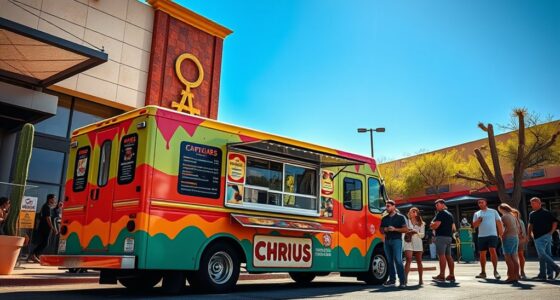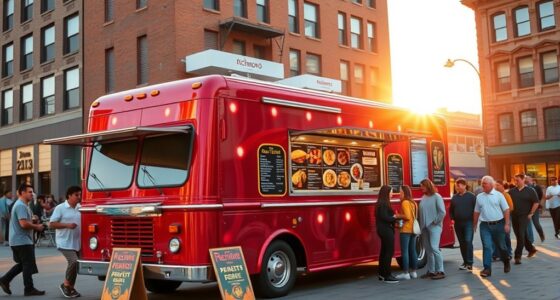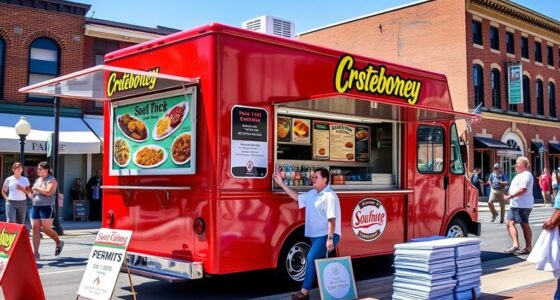To open a food truck in Eugene, Oregon, you’ll need to obtain permits from Lane County Public Health, get a business license, and meet safety standards like fire codes and vehicle regulations. Expect costs for licenses, insurance, and equipment, and make sure your truck is mobile and compliant with zoning laws. Choose location wisely, plan a menu that fits your truck classification, and use social media and local events for marketing. Keep exploring—there’s much more to know.
Key Takeaways
- Obtain necessary permits including a mobile food unit license from Lane County Public Health and ensure all food handlers have Oregon Food Handlers Cards.
- Plan a budget covering licensing fees, insurance, vehicle costs, equipment, supplies, and permits, considering location and menu expenses.
- Verify zoning restrictions and secure permits for permitted operating zones such as commercial districts, event zones, and designated parking areas.
- Design a compliant menu and packaging that meet Oregon safety, sanitation, fire code, and sustainability standards, including approved container options.
- Utilize social media, participate in local events, and partner with community venues for marketing, visibility, and customer engagement.
Navigating Licensing and Permit Requirements in Eugene
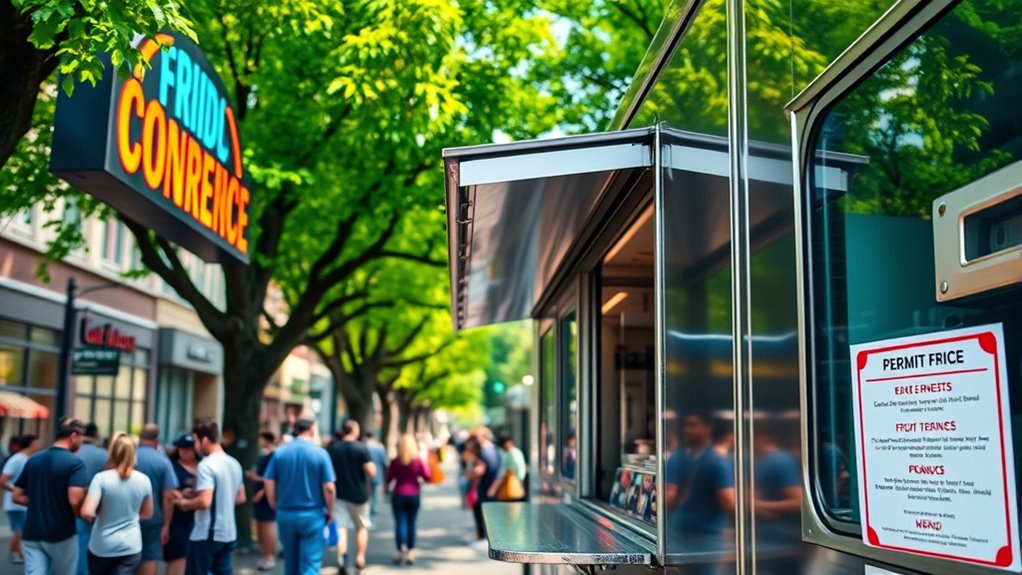
To operate a food truck in Eugene, you need to navigate a series of licensing and permit requirements set by local, state, and federal authorities. First, obtain a mobile food unit license from Lane County Public Health, which is mandatory. All personnel serving food must have an Oregon Food Handlers Card. Before licensing, your truck’s plan must undergo a review by the local Environmental Health department. You must also display all permits visibly on-site. Your vehicle needs to meet Oregon Vehicle Code standards, be self-propelled, and avoid attachment to structures. No onsite water or hard-wired electricity is permitted—only flexible cords. Additionally, you’ll need to secure various permits for fire safety, sanitation, and zoning, and ensure your vehicle has proper insurance coverage. It’s also important to stay informed about regulatory oversight which can impact safety and compliance standards for food trucks.
Ensuring Regulatory Compliance and Safety Standards
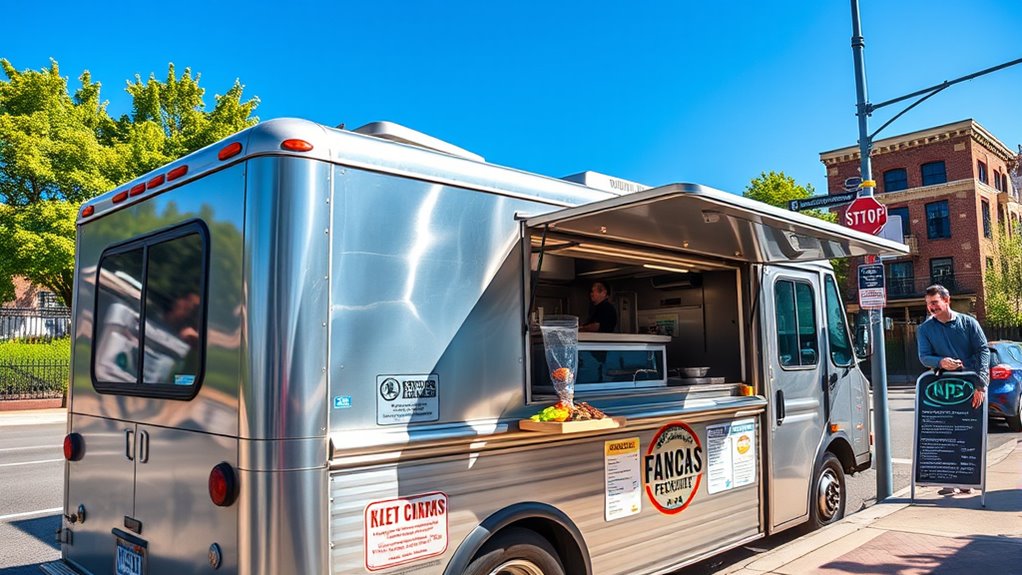
Maintaining regulatory compliance and safety standards is essential for operating a food truck in Eugene. You must follow the 2022 Oregon Fire Code, especially Section 319, which addresses fire and life safety risks from cooking appliances. If your truck produces smoke or grease vapors, an exhaust hood is required under Section 606. Maintain at least five feet of spacing from other structures to reduce fire hazards. Propane storage must align with NFPA guidelines, and updated venting and storage rules for oils are mandatory. All food handlers need valid Oregon Food Handlers Cards, and your truck must meet sanitation standards to prevent contamination. Ensure your unit is mobile, on wheels, and compliant with structural safety codes. Adhere to zoning laws, avoid obstructive placement, and implement safety protocols for employees and the public. Researching local regulations is also crucial to ensure full compliance with Eugene’s specific requirements. Additionally, staying informed about interior safety standards can help prevent accidents and ensure a safe environment for staff and customers.
Understanding Costs, Fees, and Insurance Needs

To operate your food truck in Eugene, you need to understand the costs involved, including licensing fees, insurance requirements, and other expenses. These costs vary based on your specific setup, location, and coverage choices. Being aware of these factors helps you budget effectively and ensure your business stays compliant. Understanding local regulations and city ordinances is essential, as they can significantly impact your overall startup costs and ongoing expenses. Additionally, reviewing best business practices for food trucks can help you optimize your operations and reduce unforeseen costs.
Licensing Fee Structures
Understanding the licensing fee structures for food trucks in Eugene involves knowing the various costs you’ll face at different stages of your operation. Fees vary by municipality and can include flat rates, percentage-based charges, or a combination. For example, Lane County requires a mobile food unit license, with costs ranging from $65 to 2.2% of net income, plus plan review fees from the Environmental Health Department. You may also encounter:
- Business license fees, which can vary widely, like Springfield’s $55 annual fee
- Additional permits for zoning, fire safety, or special events
- Fees for health inspections and plan reviews
- Costs associated with complying with local regulations and renewal requirements
- The horsepower of electric dirt bikes can produce between 10 to 20 horsepower, which may influence the power requirements for your food truck’s refrigeration and cooking equipment.
Being aware of these structures helps you plan your budget effectively and stay compliant.
Insurance Coverage Requirements
Finding insurance requirements for your food truck in Eugene is essential to stay compliant and protect your business. Oregon law mandates all vehicles, including food trucks, carry commercial auto liability insurance, both when parked and driving. Personal auto policies don’t cover business use, so you’ll need a commercial auto policy that meets state liability thresholds to avoid fines or shutdowns. A business owner’s policy (BOP) can combine general liability and property coverage, protecting against customer injuries or food-related claims. If you have employees, workers’ compensation insurance is required, covering workplace injuries and legal protection. Additional coverage like liquor liability, product liability, and equipment protection may also be necessary based on your services. Shopping around for tailored policies ensures you get the right coverage at a competitive price. Ensuring your insurance coverage includes heated mattress pads can be beneficial if you plan to offer comfortable sleeping arrangements or accommodations related to your business.
Additional Cost Considerations
Managing costs for your food truck in Eugene involves more than just insurance and permits; it also requires careful consideration of various fees and ongoing expenses. Permit fees vary, averaging around $1,864 nationally, and local charges may apply for special locations or events. Operating costs include fuel ($600/month), maintenance ($500–$1,000 initially), and supplies like containers and utensils. Weekly food ingredient costs can exceed $1,000, depending on menu and customer volume. Staffing expenses cover wages, taxes, and benefits for 1–6 employees, influencing service quality and revenue. Additionally, marketing costs—often 12–20% of gross revenue—cover social media, events, and signage. Budgeting for unexpected repairs, permits, utilities, and administrative costs helps guarantee your food truck stays financially sustainable. Considering the full scope of expenses is essential for long-term success and profitability. It is also important to stay informed about regulatory compliance and potential security vulnerabilities that could impact your operations.
Identifying Permitted Operating Locations and Zones

To operate legally in Eugene, Oregon, you need to know where food trucks are permitted to park and vend. Zoning laws restrict commercial activities in residential zones, so verify allowances with city and county offices. Food trucks are allowed in specific commercial, industrial, and public event zones where permits are issued. Some designated parking areas exist but require confirmation from local authorities. Use of streets, sidewalks, and public property must follow regulations. Additionally, understanding local zoning restrictions can help prevent violations and ensure compliant operations.
Planning Your Menu for Success and Compliance

To create a successful menu, you need to understand Oregon’s food safety regulations and how they tie into your truck’s classification. Your equipment and space limitations also shape what dishes you can realistically serve, while packaging choices must comply with statewide bans. By balancing these factors, you’ll develop a menu that’s both appealing and compliant with local rules. Considering the types of juices and fresh ingredients you plan to serve, understanding juice cleansing protocols can help you cater to health-conscious customers seeking detox options.
Menu Safety Regulations
Understanding Oregon’s food truck classifications is essential for planning a menu that is both successful and compliant. Your menu must align with your unit’s class, such as Class I for prepackaged foods or Class IV for full menus. Serving potentially hazardous foods requires higher classifications and proper handling to prevent health violations. Changes to your menu, like adding raw animal foods, may trigger reclassification.
To stay compliant, you need to:
- Follow Oregon Food Sanitation Rules for storage, temperature, and sanitation
- Ensure food handlers have an Oregon Food Handlers Card
- Use approved systems for water and waste management
- Properly label allergens and packaged foods, avoiding banned materials
- Incorporate mindfulness techniques into your food handling practices to reduce stress and improve focus during busy service hours, ensuring safety and quality.
Staying within your classification limits safeguards your license and ensures safe, quality food service.
Equipment and Space Limits
Planning your menu around equipment and space limits is essential for both compliance and efficiency. Your food truck must be self-propelled or towable, with dimensions around 3 by 7 feet and a canopy no larger than 49 square feet. The vehicle can’t be enclosed or attached to structures and must remain mobile at all times. Utility connections are limited to flexible cords; no permanent water or electrical hookups are allowed. Inside, the layout must support food prep, storage, and service, with auxiliary storage stored in sealed containers. Equipment choices should be compact and multi-functional to maximize space. Keep a minimum five-foot clearance from other units or structures for fire safety. Always verify your equipment and menu items meet Oregon’s fire and safety regulations to stay compliant. Additionally, consider efficient space utilization to optimize your workflow within the limited dimensions.
Food Packaging Choices
Choosing the right food packaging is essential for your food truck’s success and compliance with Oregon regulations. Statewide, polystyrene foam containers are banned starting January 1, 2025, so you’ll need alternative options. Your packaging must also protect food during transport, ensuring everything is covered, wrapped, or sealed to prevent contamination. Additionally, secure storage of utensils and napkins is required under Oregon mobile food laws. To align with new Extended Producer Responsibility (EPR) rules, opt for recyclable, compostable, or reusable materials. Consider these points:
- Use biodegradable or certified compostable containers
- Avoid plastics prohibited in Oregon, like polystyrene foam
- Partner with local recycling programs for waste diversion
- Ensure packaging maintains temperature and prevents leaks
- Oregon’s EPR program supports recycling infrastructure, which makes choosing recyclable or compostable packaging even more impactful for your sustainability goals.
Smart choices support compliance and sustainability.
Developing Effective Marketing Strategies in Eugene
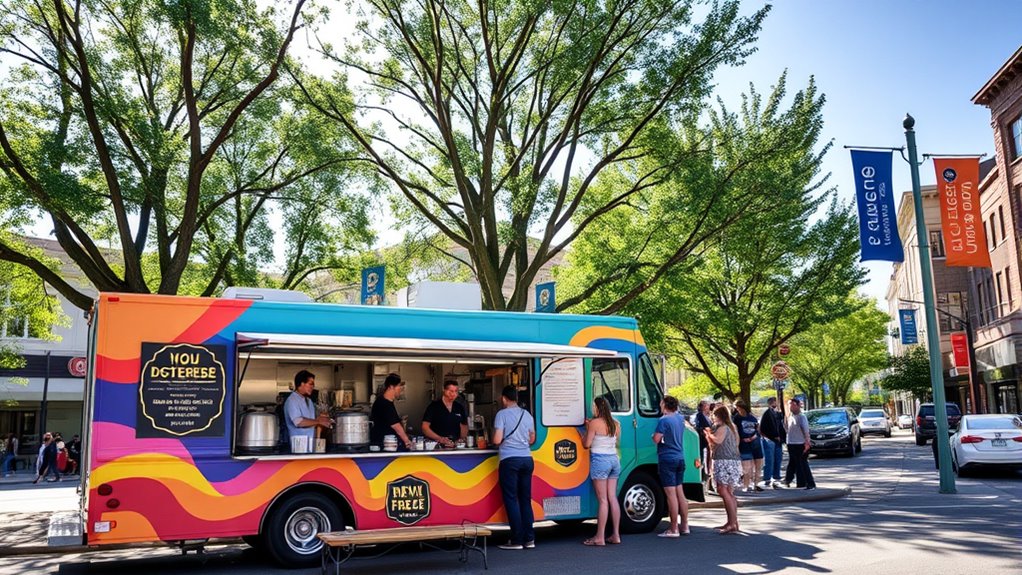
To effectively market your food truck in Eugene, you need to leverage the city’s vibrant local scene and tech-savvy audience. Focus on engaging the 25-44 age group, especially millennials, who love discovering new, locally-sourced, and sustainable foods. Use social media platforms like Instagram and TikTok to showcase vibrant images, behind-the-scenes content, and special promotions. Participating in popular events, food truck pods, and community festivals boosts visibility and attracts new customers. Collaborate with local breweries, wineries, and event organizers for cross-promotions. Highlight your eco-friendly practices and seasonal menu updates to appeal to Eugene’s environmentally conscious consumers. Encourage customer-generated content with branded hashtags, and consider geo-targeted ads to reach nearby audiences. Consistent, authentic marketing builds your brand’s presence and fosters community loyalty. Understanding Eugene’s local market trends and regional preferences can help tailor your offerings and promotional strategies more effectively.
Tips for a Smooth Launch and Ongoing Operations

Launching and running a food truck smoothly requires careful preparation and ongoing attention to detail. To guarantee success, focus on compliance, efficiency, and quality. Verify that your truck meets Eugene’s vehicle code, ensuring it’s mobile and free to move at all times. Keep electrical connections flexible and avoid permanent water hookups to stay within regulations. Hire and train staff thoroughly, emphasizing food safety and customer service, then schedule regular maintenance to prevent breakdowns. Monitor inventory closely to control costs and minimize waste, especially since raw material expenses can be high. Ongoing staff training and adherence to safety standards are essential for maintaining quality and customer trust. Develop a detailed budget covering permits, equipment, and supplies. Establish clear operational procedures for setup and service. Track expenses diligently to maintain profitability. Gather customer feedback regularly for continuous improvement.
Frequently Asked Questions
How Long Does the Permit Approval Process Typically Take in Eugene?
You’re wondering how long the permit approval process in Eugene takes. Typically, it ranges from 3 to 8 weeks, depending on how complete your application is and if any additional information or corrections are needed. Factors like staffing, application volume, and seasonal workloads can also influence this timeline. To speed things up, guarantee your plans and documents are accurate and submit all required certifications promptly.
Are There Specific Restrictions on Operating Hours for Food Trucks in Eugene?
The current question about Eugene’s food truck hours is a clear sky—there are no strict restrictions on operating hours. You can run your truck without set curfews, thanks to Eugene’s flexible approach. While you must follow health and safety laws, the city’s regulations don’t tie your hands with specific time limits. This freedom allows you to adapt your hours based on demand, events, and customer flow, making your operation as dynamic as the city itself.
Can I Operate My Food Truck on Private Property in Eugene?
You can operate your food truck on private property in Eugene, but you need permission from the property owner. Make certain you have the necessary health licenses from Lane County and follow all safety and sanitation rules. Keep your truck mobile—no permanent attachments—and avoid setting up without proper agreements. Always check zoning laws and obtain any event-specific permits if needed. Clear communication with property owners helps you stay compliant and avoid legal issues.
What Are the Penalties for Non-Compliance With Eugene’S Food Truck Regulations?
Imagine the fine line between success and penalties—cross it, and Eugene’s strict regulations will catch you. If you operate without proper permits or violate health, zoning, or parking rules, you face escalating civil fines, from $50 to $500 per violation. Repeat offenses within a year increase penalties. Non-compliance with safety standards or operating outside approved zones can lead to shutdowns, costly fines, or legal trouble—better to stay compliant and avoid penalties altogether.
How Do I Renew My Permits and Licenses Annually in Eugene?
To renew your permits and licenses annually in Eugene, you need to submit a renewal application to Lane County Public Health before your current permits expire. Make sure your food handlers are current, pass recent health inspections, and pay any applicable fees. You can renew online, in person, or by mail. Keep all documentation up to date, and report any operation changes during the renewal process to stay compliant.
Conclusion
Launching your food truck in Eugene is like planting a seed—you’ll nurture it with permits, a tasty menu, and clever marketing. Stay compliant and adaptable, and watch your business bloom amidst the city’s vibrant food scene. With patience and passion, your truck will become a rolling feast that draws in locals and visitors alike. Keep your gears turning smoothly, and your culinary journey will flourish like a garden bursting with flavor.


